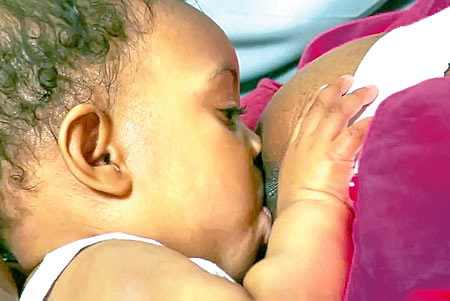BREASTFEEDING is one issue that all parents have a view on. But irrespective of different people’s opinion, health experts all recommend breastfeeding to give babies the best start in life. The benefits are seemingly endless.
However, practices on the ground in Nigeria are very far from ideal. The 2018 Nigeria Demographic and Health Survey (NDHS) put the rate of babies that were exclusively breastfeed in their first six months of life at 29 per cent.
Children who were breastfed within one hour of birth in Nigeria (42 per cent) remains less than 50 per cent. In fact, 83 per cent of the children are breastfed up to one year. Whole 28 per cent are breastfeeding till two years, showing that proportion of children who are not breastfeeding increases with age.
So what can be done to increase breastfeeding rates? While it might seem sensible for maternity services to focus their attention solely on mothers, the evidence suggests that fathers also have an important role to play.
Studies have shown that amid a range of social, cultural, socio-economic, and psychological factors, the father is one of the most influential persons in terms of a mother’s decision to initiate and continue breastfeeding. Father’s knowledge about breastfeeding, attitudes to breastfeeding, involvement in decision-making, practical support and emotional support is very important.
Clinical trials like the one carried out in Australia in 2013 found that even a minimal amount of intervention with fathers can make a significant difference to the rate of breastfeeding at six weeks and beyond. The trial showed a significant increase (6.4 per cent) in nursing rates in a group where the fathers had attended breastfeeding sessions.
“Breastfeeding is a shared responsibility; everyone including fathers have a role to play in supporting the mother and protecting breastfeeding should encourage the woman to breastfeed, take off some of the chores off her and give her the time to be with the baby to breastfeed,” Mrs Ada Ezeogu, a nutrition specialist with the United Nations Children’s Funds (UNICEF), said.
Mrs Ezeogu, added “for instance, he can be helping to massage her back during breastfeeding. He can also help to ensure a safe environment and protect her from in-laws because some in-laws that are older may not understand why she is not given the new baby water or formula, for instance, and this could become a problem.”
In some cases, fathers can be instrumental in the decision not to move from breastfeeding to formula. Such decisions may be underpinned by various anxieties on behalf of the in-laws, such as not being able to determine how much breast milk the baby is getting, concerns over easily treatable (albeit painful) cracked nipples and mastitis and the exposure of the breasts when breastfeeding in public.
Moreover she added that the fathers by providing her the right nutrition so that she can be healthy for herself and she will be able to take care of the baby is important.
Mrs Ezeogu, said at the community level, words of encourage for mothers who breastfeed, provision of safe spaces to practice exclusive breastfeeding and always project breastfeeding in a good light, provision of breastfeeding rooms and breaks at the work place as well as adequate maternity leave is important to encourage babies are breastfeed for longer periods.
The UNICEF’s nutrition expert said that exclusive breastfeeding is a win-win for the child, the mother, family and the society in general given that breast milk contains nutrients that are essential for a child’s growth and development.
“It saves the woman’s life and contributes to the human capital development; less money is spent of hospital visits due to diarrheal and other childhood illnesses. It promotes proper teeth formation, baby’s mental and speech development and better bonded with the mother.
“Exclusive breastfeeding makes sure the weight can come down after delivery; it helps to ensure that the womb can retract and control bleeding after child birth. If a woman exclusively breast feeding, she is also protected from a new pregnancy immediately after that child.
“She is protected from serious diseases as breast and ovarian cancers. There are evidence that it also protects against hip fracture later in life and some cardiovascular diseases when the woman breastfeed for two years and beyond.”
However, she stated that women also have a role to play to ensure babies are adequately breastfeed. “We always encourage women once pregnant to go for antenatal care and within the period, she will be thought the benefits of breastfeeding. This will ensure that she understand and be psychologically prepared to breastfeed.”
Mrs Ezeogu said that for adequate breast milk production after delivery, women are encouraged to take plenty of water during pregnancy and lactation; examine and encourage breast care during pregnancy, must be helped to put the baby to the breast within one hour of delivery.
She said sucking of the breast should continue until breast milk starts flowing and new babies should be not be given water, infant formula, glucose water or any fluids. Also, resolving breastfeeding difficulties such as breast pain, engorgement and poor latching of the baby is also important.
YOU SHOULD NOT MISS THESE HEADLINES FROM NIGERIAN TRIBUNE
We Have Not Had Water Supply In Months ― Abeokuta Residents
In spite of the huge investment in the water sector by the government and international organisations, water scarcity has grown to become a perennial nightmare for residents of Abeokuta, the Ogun State capital. This report x-rays the lives and experiences of residents in getting clean, potable and affordable water amidst the surge of COVID-19 cases in the state…
Selfies, video calls and Chinese documentaries: The things you’ll meet onboard Lagos-Ibadan train
The Lagos-Ibadan railway was inaugurated recently for a full paid operation by the Nigerian Railway Corporation after about a year of free test-run. Our reporter joined the train to and fro Lagos from Ibadan and tells his experience in this report…




